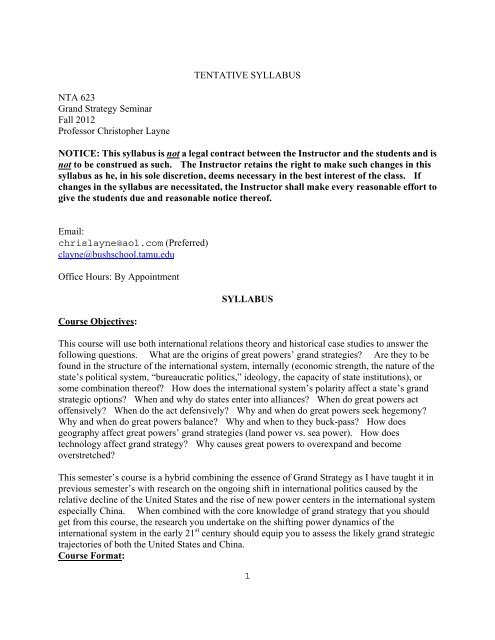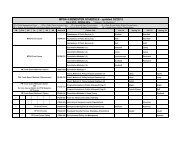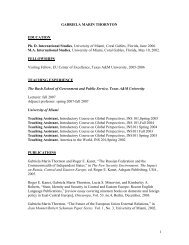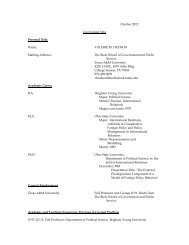Layne - Fall 2012 - Bush School of Government and Public Service
Layne - Fall 2012 - Bush School of Government and Public Service
Layne - Fall 2012 - Bush School of Government and Public Service
Create successful ePaper yourself
Turn your PDF publications into a flip-book with our unique Google optimized e-Paper software.
NTA 623<br />
Gr<strong>and</strong> Strategy Seminar<br />
<strong>Fall</strong> <strong>2012</strong><br />
Pr<strong>of</strong>essor Christopher <strong>Layne</strong><br />
TENTATIVE SYLLABUS<br />
NOTICE: This syllabus is not a legal contract between the Instructor <strong>and</strong> the students <strong>and</strong> is<br />
not to be construed as such. The Instructor retains the right to make such changes in this<br />
syllabus as he, in his sole discretion, deems necessary in the best interest <strong>of</strong> the class. If<br />
changes in the syllabus are necessitated, the Instructor shall make every reasonable effort to<br />
give the students due <strong>and</strong> reasonable notice there<strong>of</strong>.<br />
Email:<br />
chrislayne@aol.com (Preferred)<br />
clayne@bushschool.tamu.edu<br />
Office Hours: By Appointment<br />
Course Objectives:<br />
SYLLABUS<br />
This course will use both international relations theory <strong>and</strong> historical case studies to answer the<br />
following questions. What are the origins <strong>of</strong> great powers’ gr<strong>and</strong> strategies? Are they to be<br />
found in the structure <strong>of</strong> the international system, internally (economic strength, the nature <strong>of</strong> the<br />
state’s political system, “bureaucratic politics,” ideology, the capacity <strong>of</strong> state institutions), or<br />
some combination there<strong>of</strong>? How does the international system’s polarity affect a state’s gr<strong>and</strong><br />
strategic options? When <strong>and</strong> why do states enter into alliances? When do great powers act<br />
<strong>of</strong>fensively? When do the act defensively? Why <strong>and</strong> when do great powers seek hegemony?<br />
Why <strong>and</strong> when do great powers balance? Why <strong>and</strong> when to they buck-pass? How does<br />
geography affect great powers’ gr<strong>and</strong> strategies (l<strong>and</strong> power vs. sea power). How does<br />
technology affect gr<strong>and</strong> strategy? Why causes great powers to overexp<strong>and</strong> <strong>and</strong> become<br />
overstretched?<br />
This semester’s course is a hybrid combining the essence <strong>of</strong> Gr<strong>and</strong> Strategy as I have taught it in<br />
previous semester’s with research on the ongoing shift in international politics caused by the<br />
relative decline <strong>of</strong> the United States <strong>and</strong> the rise <strong>of</strong> new power centers in the international system<br />
especially China. When combined with the core knowledge <strong>of</strong> gr<strong>and</strong> strategy that you should<br />
get from this course, the research you undertake on the shifting power dynamics <strong>of</strong> the<br />
international system in the early 21 st century should equip you to assess the likely gr<strong>and</strong> strategic<br />
trajectories <strong>of</strong> both the United States <strong>and</strong> China.<br />
Course Format:<br />
1
This is a seminar, not a lecture class. The seminar format is the st<strong>and</strong>ard one for graduate<br />
instruction in top U.S. universities. A seminar means that the students need to take a good deal <strong>of</strong><br />
the ownership <strong>of</strong> the class, <strong>and</strong> show initiative in the discussions. In a seminar, the instructor does<br />
minimal, if any, lecturing, <strong>and</strong> st<strong>and</strong>s on a more or less equal footing with the students during<br />
discussion. The exchange <strong>of</strong> ideas through discussion is how knowledge is gained. A seminar,<br />
however, requires commitment from the students. For this course to work, you must do the<br />
readings, <strong>and</strong> - at equally important - think hard about the issues raised therein. Attendance, <strong>and</strong><br />
participation in the class discussions, is the key to making a seminar work. Therefore, although<br />
roll will not be taken formally, it is important that you attend all scheduled class sessions.<br />
To help focus class discussion, each student is required to submit by email to the instructor, <strong>and</strong> the<br />
discussion leaders, by 9pm the night before class meets, one or two questions, observations, or<br />
particularly interesting responses to the readings.<br />
Requirements:<br />
The grade will be based on three components: (1) Presentation <strong>of</strong> a draft paper for seminar<br />
discussion; (2) Final term paper (on the same topic as presented for seminar discussion); <strong>and</strong> (3)<br />
the assigned research tasks your teams produce on the shifting power dynamics <strong>of</strong> the early 21sst<br />
century international political system. There will be no final examination.<br />
Course Requirements/Grading:<br />
Final Research Paper: 50% <strong>of</strong> course grade. Due Date: 7 December <strong>2012</strong>. Papers (hard copies<br />
only) are due in my box in the Faculty Workroom by 5pm. Papers submitted by fax or email will<br />
not be accepted.<br />
Papers will be an historical case studies that also incorporates the theoretical material covered the<br />
course. Specific topics will be determined by the instructor in consultation with each student.<br />
To the extent possible, I will try to match each student with a topic <strong>of</strong> interest to them.<br />
By 10 September, you are required to submit to me a short (2-4) page paper proposal. This<br />
should set out your hypotheses, data, methodology, <strong>and</strong> a short bibliography. Submit hard copy<br />
only by 5pm, 21 September in my mailbox in the Faculty Mail Room.<br />
Final papers are to be a maximum <strong>of</strong> 25 pages (double-spaced), exclusive <strong>of</strong> endnotes <strong>and</strong><br />
bibliography. Papers must be in a scholarly format, with an introduction, thesis statement, main<br />
body, <strong>and</strong> conclusions. This is a research paper, which means you must use materials outside <strong>of</strong><br />
the assigned readings to enrich your argument <strong>and</strong> analysis. To avoid the dangers <strong>of</strong> plagiarism,<br />
your sources must be properly cited. I prefer that you use the Chicago Manual citation style.<br />
Papers will be graded on the basis <strong>of</strong>: quality <strong>of</strong> critical analysis; creativity; clarity; research effort;<br />
<strong>and</strong> Your ability to combine theory with historical evidence..<br />
For an excellent discussion <strong>of</strong> what makes a good research paper - <strong>and</strong> useful tips on how to write<br />
2
one - I strongly suggest that you read Stephen Van Evera, A Guide to Methods for Students <strong>of</strong><br />
Political Science (Cornell University Press, 1997), pp. 89-95, 97-109, 123-128.<br />
NOTE: It is not acceptable to h<strong>and</strong> in the same assignment for more than one course.<br />
Translation: you cannot “recycle” work you have done for other courses for this class.<br />
Draft Paper <strong>and</strong> Presentation: 10% <strong>of</strong> course grade.<br />
Special Research Team Projects on the Shifting Balance <strong>of</strong> Global Power in the Early 21 st Century:<br />
40% <strong>of</strong> course grade. These grades will be assigned on a team basis.<br />
The 22, 29 October <strong>and</strong> 5 November class meetings will be set aside [tentatively] for<br />
presentations <strong>of</strong> draft papers. Each student will make an oral presentation in class based upon a<br />
draft <strong>of</strong> your research paper. The oral presentations will serve as one <strong>of</strong> the bases for class<br />
discussion during these weeks. The draft paper should be reasonably polished, <strong>and</strong> should not<br />
exceed 15 pages in length. The class discussion <strong>and</strong> critique <strong>of</strong> draft papers should provide<br />
feedback <strong>and</strong> suggestions to incorporate into your final paper. The final paper, therefore, should<br />
show significant revision from the draft paper, based on comments from the instructor <strong>and</strong> from<br />
your peers - as well as your own evolved thinking about your topic.<br />
Draft papers should be circulated by email to the instructor <strong>and</strong> to all class members no<br />
later than 48 hours prior to their scheduled presentation in class.<br />
Discussion Leadership: Discussion leadership is a course requirement but will not be graded.<br />
There are two components to discussion leadership: (1) Leading the class discussion <strong>of</strong> the<br />
assigned weekly readings; <strong>and</strong> (2) serving as discussant/commentator on a draft paper<br />
presentation.<br />
All students will be responsible for leading at least one class discussion. Depending on<br />
enrollment, students may be called upon to lead more than one discussion.<br />
Discussion leaders are responsible for discussing the assigned readings for the class session,<br />
raising questions for class discussion, <strong>and</strong> preparing a Power Point presentation that identifies the<br />
key themes <strong>of</strong> the readings <strong>and</strong> sets out a number <strong>of</strong> discussion questions. Discussion leaders are<br />
to go beyond providing a mere summary <strong>of</strong> the reading (because all students are required to do the<br />
assigned readings). The function <strong>of</strong> discussion leaders in not to regurgitate the assigned readings,<br />
but rather to engage the material, highlight the main points, <strong>and</strong> get the class involved in debating<br />
<strong>and</strong> discussing the material. You should also feel free to bring up what you think is wrong, or<br />
missing, from the arguments made in the readings under discussion. Discussion leaders will be<br />
evaluated on the basis <strong>of</strong> the substance <strong>and</strong> style <strong>of</strong> the presentation, as well as on the quality <strong>of</strong> the<br />
Power Point presentation <strong>and</strong> discussion questions. The instructor will be looking especially for<br />
evidence that you have carefully read <strong>and</strong> thought about the assigned readings. Your<br />
presentations are expected to cover the main points, issues, <strong>and</strong> arguments that arise from the<br />
readings. Discussion leaders should situate the readings theoretically, critique them, dissect the<br />
causal logics <strong>of</strong> the arguments, <strong>and</strong> consider their policy implications.<br />
3
In addition to leading discussions based on assigned readings, each <strong>of</strong> will be required to comment<br />
upon, <strong>and</strong> critique, the draft paper <strong>of</strong> one <strong>of</strong> your classmates following the oral presentation<br />
there<strong>of</strong>. In academic conferences it is st<strong>and</strong>ard procedure to have a discussant critique the papers<br />
<strong>of</strong> the panelists. That is the model here. A good discussant clearly highlights BOTH the<br />
strengths <strong>and</strong> weaknesses <strong>of</strong> the paper in terms <strong>of</strong> its argument, evidence, <strong>and</strong> writing. The<br />
purpose <strong>of</strong> the discussant’s comments is to help the author during the revision process.<br />
Late Assignments:<br />
*Failure to turn-in an assignment on time will result in an automatic lowering <strong>of</strong> the grade<br />
for that assignment by one full letter grade for each 24 hour period between the due date<br />
<strong>and</strong> the date the assignment is turned in. Example: a one date late A assignment would<br />
become a B. This policy will apply to all late assignments unless there is documented good<br />
cause for failure to submit an assignment on time.<br />
*To obtain credit for this class, all course requirements must be fulfilled. Failure to<br />
complete all course assignments will result in a grade <strong>of</strong> F.<br />
Procedure for Appealing Grades:<br />
If you are believe a grade does not fully reflect the quality <strong>of</strong> your work <strong>and</strong> you wish to appeal the<br />
grade, you must submit to me a written statement -<br />
not exceeding 2 pages in length - setting forth with<br />
specificity the reasons you believe that your grade<br />
should be revised. After reviewing your written<br />
statement, I will make an appointment to discuss the<br />
matter with you. After we meet, I will make a<br />
decision on your appeal.<br />
Academic Integrity:<br />
The <strong>Bush</strong> <strong>School</strong> is committed to the development <strong>of</strong> principled leaders for public service. The<br />
commitment to "principled leadership" is a further expansion <strong>of</strong> the Texas A&M student honor<br />
code that states: “An Aggie will not lie, cheat or steal nor tolerate those who do.” Each student<br />
in this course must comply with this code in all work submitted for a grade <strong>and</strong> will be held<br />
accountable accordingly. Anyone who is not prepared to adhere to this st<strong>and</strong>ard should<br />
immediately withdraw from this course.<br />
Specific attention is directed to the requirement to avoid plagiarism, or the appearance <strong>of</strong><br />
plagiarism through sloppy citation. As commonly defined, plagiarism consists <strong>of</strong> passing <strong>of</strong>f as<br />
one's own ideas, words, writings, etc, that which belong to another. In accordance with this<br />
definition, you are committing plagiarism if you copy the work <strong>of</strong> another person <strong>and</strong> turn it in as<br />
your own, even if you have the permission <strong>of</strong> that person. It does not matter from where the<br />
material is borrowed --a book, an article, material <strong>of</strong>f the web, another student's paper– all<br />
constitute plagiarism unless the source <strong>of</strong> the work is fully identified <strong>and</strong> credited. It is important<br />
4
when using a phrase, a distinct idea, concept, a sentence, or sentences from another source to credit<br />
explicitly that source either in the text, a footnote or endnote. Plagiarism is a violation <strong>of</strong><br />
academic <strong>and</strong> personal integrity <strong>and</strong> carries extremely serious consequences. Scholastic<br />
dishonesty (including cheating, multiple submission <strong>of</strong> your work for grades in different courses<br />
<strong>and</strong> plagiarism) will not be tolerated <strong>and</strong> will be punished. Further information can be found at<br />
http://www.tamu.edu/aggiehonor/acadmisconduct.htm<br />
Suspected instances <strong>of</strong> academic misconduct will be referred to the University Honor Committee.<br />
Americans with Disability Act:<br />
The Americans with Disability Act (ADA) is a federal anti-discrimination statute that provides<br />
comprehensive civil rights protection for persons with disabilities. Among other things, this<br />
legislation requires that all students with disabilities be guaranteed a learning environment that<br />
provides for reasonable accommodation <strong>of</strong> their disabilities. If you believe you have a disability<br />
requiring accommodation, please advise the instructor promptly.<br />
Laptops:<br />
Laptop computers may used in the classroom. However, they may be used for class-related<br />
purposes only. If you use a laptop in class I will assume that you have, pursuant to the Aggie<br />
Honor Code, given me your word that you are using it for class-related purposes.<br />
Make-Up Classes:<br />
Should it become necessary to schedule a make-up class, I will consult with the class to find the<br />
most convenient time for the majority <strong>of</strong> the students.<br />
Attendance at make-up sessions is not m<strong>and</strong>atory, <strong>and</strong> because there is no final examination in this<br />
class, students unable to attend a make-up session (or sessions) will not be disadvantaged with<br />
respect to grading because <strong>of</strong> inability to attend. However, if it is necessary to schedule make-up<br />
sessions I hope you will be interested enough in the subject matter <strong>of</strong> this course to attend.<br />
Reading Assignments:<br />
The reading list for this course contains both required <strong>and</strong> suggested readings. The required<br />
readings are divided into two categories. First, there are readings that will be read by the entire<br />
class. It is m<strong>and</strong>atory that you read these, <strong>and</strong> be prepared to discuss them in class. Second,<br />
there are is a “menu” <strong>of</strong> further readings from which students will be required to read some - but<br />
not all - <strong>of</strong> the materials in this category. My goal here is to reduce the overall reading burden on<br />
each <strong>of</strong> you. Although this could change depending on the enrollment in the course, my plan is to<br />
allow each student to choose which <strong>of</strong> the materials in this category they will read. However, I<br />
am going to ask that you each coordinate among yourselves to ensure that each <strong>of</strong> the readings in<br />
the “menu” category is read by at least one member <strong>of</strong> the class, <strong>and</strong> to inform me prior to each<br />
class meeting which <strong>of</strong> you has read which <strong>of</strong> the readings for the week that are in this category.<br />
5
Students are not required to read the suggested readings, <strong>and</strong> will not be held accountable for<br />
them. They are included for informational purposes only in the event you wish to pursue a<br />
particular topic in greater depth than is covered in the assigned readings. The suggested<br />
readings may also help in the preparation <strong>of</strong> your research papers.<br />
NOTE: Additional required readings may be added to - or deleted from - the syllabus as the course<br />
progresses. I will give advance notice, both in class <strong>and</strong> by email, <strong>of</strong> any readings added<br />
to/deleted from the syllabus.<br />
BOOKS<br />
(Recommended, but not required, for purchase)<br />
Graham Allison <strong>and</strong> Philip Zelikow, The Essence <strong>of</strong> Decision: Explaining the Cuban Missile<br />
Crisis (Longman, 2d. Ed., 1999).<br />
Paul Kennedy, The Rise <strong>and</strong> <strong>Fall</strong> <strong>of</strong> British Naval Mastery (Humanity Books, 2006).<br />
Paul Kennedy, The Rise <strong>of</strong> the Anglo-German Antagonism (Humanity Books, 1988)<br />
Paul Kennedy, The Rise <strong>and</strong> <strong>Fall</strong> <strong>of</strong> the Great Powers: Economic Change <strong>and</strong> Military Conflict<br />
from 1500 to 2000 (Vintage Books, 1989).<br />
Beatrice Heuser, The Evolution <strong>of</strong> Strategy: Thinking War from Antiquity to the Present<br />
(Cambridge University Press, 2010).<br />
Williamson Murray, Macgregor Knox, Alvin Bernstein, eds., The Making <strong>of</strong> Strategy: Rulers,<br />
States, <strong>and</strong> Wars (Cambridge University Press, 1996).<br />
Williamson Murray, Richard Hart Simmreich, <strong>and</strong> James Lacey, eds., The Shaping <strong>of</strong> Gr<strong>and</strong><br />
Strategy: Politics, Diplomacy <strong>and</strong> War (Cambridge: Cambridge University Press, 2011).<br />
Peter Paret, Gordon Craig, <strong>and</strong> Felix Gilbert (eds.), Makers <strong>of</strong> Modern Strategy: From Machiavelli<br />
to the Nuclear Age (Princeton University Press, 1986).<br />
All <strong>of</strong> these books are available in paperback. They are available for purchase from the<br />
Bookstore <strong>and</strong> also can be purchased from Amazon.com. At least one hard copy <strong>of</strong> each <strong>of</strong> these<br />
books will be on reserve at the PESL (in the Presidential Conference Center).<br />
All other materials should be available on e-reserve<br />
.<br />
THEORETICAL BACKGROUND<br />
Week 1 (27 August)<br />
What is Gr<strong>and</strong> Strategy <strong>and</strong> Why is it Important?<br />
6
B.H. Liddell Hart, “Fundamentals <strong>of</strong> Strategy <strong>and</strong> Gr<strong>and</strong> Strategy,” in B.H. Liddell Hart, Strategy<br />
(2d. ed.), pp. 319-370<br />
Paul Kennedy, “Gr<strong>and</strong> Strategy in War <strong>and</strong> Peace: Toward a Broader Definition,” in Paul<br />
Kennedy, ed., Gr<strong>and</strong> Strategies in War <strong>and</strong> Peace, pp. 1-7<br />
Williamson Murray <strong>and</strong> Mark Grimsley, “Introduction: On Strategy,” in Murray, Knox, <strong>and</strong><br />
Bernstein, The Making <strong>of</strong> Strategy, pp. 1-23<br />
Williamson Murray, “Thoughts on Gr<strong>and</strong> Strategy,” in Murray, Sinnreich <strong>and</strong> Lacey, The Shaping<br />
<strong>of</strong> Gr<strong>and</strong> Strategy, pp. 1-13.<br />
Richard Sinnreich, “Patterns <strong>of</strong> Gr<strong>and</strong> Strategy,” in in Murray, Sinnreich <strong>and</strong> Lacey, The Shaping<br />
<strong>of</strong> Gr<strong>and</strong> Strategy, pp. 254-270/<br />
Barry Posen, The Sources <strong>of</strong> Military Doctrine: France, Britain, <strong>and</strong> Germany Between the World<br />
Wars, pp. 13-33<br />
Week 2 (3 September)<br />
The Origins <strong>of</strong> Gr<strong>and</strong> Strategy:<br />
The Role <strong>of</strong> the International System<br />
Allison <strong>and</strong> Zelikow, The Essence <strong>of</strong> Decision, “Model 1: The Rational Actor,” pp. 13-76.<br />
John J. Mearsheimer, The Tragedy <strong>of</strong> Great Power Politics, pp. 29-54.<br />
Kenneth Waltz, “The Origins <strong>of</strong> War in Neorealist Theory,” Journal <strong>of</strong> Interdisciplinary History,<br />
18:4 (Spring 1988), pp. 615-628.<br />
The Origins <strong>of</strong> Gr<strong>and</strong> Strategy:<br />
The Role <strong>of</strong> Polarity<br />
Karl Deutsch <strong>and</strong> J. David Singer, “”Multipolar Power Systems <strong>and</strong> International Stability,”<br />
World Politics, 16:3 (April 1964), pp. 390-406.<br />
John J. Mearsheimer, “Back to the Future: Instability in Europe After the Cold War,” International<br />
Security, 15:1 (Summer 1990), pp. 5-56 (read pp. 13-19 only)<br />
Stephen Van Evera, “Primed for Peace: Europe After the Cold War,” International Security, 15:3<br />
(Winter 1990/91), pp. 7-57 (read pp. 33-40 only).<br />
Kenneth Waltz, “The Stability <strong>of</strong> a Bipolar World,” Daedalus, 43:3 (Summer 1964), pp. 881-909.<br />
7
The Origins <strong>of</strong> Gr<strong>and</strong> Strategy:<br />
The Role <strong>of</strong> Power Transitions<br />
A. F. K. Organski, World Politics (1968), Chapter 14.<br />
A. F. K. Organski <strong>and</strong> Jacek Kugler, The War Ledger (1980), pp. 13-28.<br />
Jack S. Levy, “Long Cycles, Hegemonic Transitions, <strong>and</strong> the Long Peace,” in Charles W. Kegley,<br />
ed., The Long Postwar Peace (1991), pp. 147-176.<br />
Week 3 (10 September)<br />
The Origins <strong>of</strong> Gr<strong>and</strong> Strategy:<br />
The Role <strong>of</strong> Unit Level Factors - An Overview<br />
Allison & Zelikow, The Essence <strong>of</strong> Decision, pp. 143-196, 255-324.<br />
Barry Posen, The Sources <strong>of</strong> Military Doctrine, pp. 34-80.<br />
The Origins <strong>of</strong> Gr<strong>and</strong> Strategy:<br />
The Role <strong>of</strong> Unit Level Factors - Economics<br />
Edward Meade Earle, “Adam Smith, Alex<strong>and</strong>er Hamilton, Friedrich List,” in Peter Paret, ed.,<br />
Makers <strong>of</strong> Modern Strategy from Machiavelli to the Nuclear Age, pp. 217-261.<br />
Paul Kennedy, The Rise <strong>and</strong> <strong>Fall</strong> <strong>of</strong> the Great Powers, pp. 3-30.<br />
The Origins <strong>of</strong> Gr<strong>and</strong> Strategy:<br />
The Role <strong>of</strong> Unit Level Factors - Strategic Culture<br />
Colin Dueck, Reluctant Crusaders: Power, Culture, <strong>and</strong> Change in American Gr<strong>and</strong> Strategy, pp.<br />
9-20.<br />
Colin S. Grey, “National Styles in Strategy: The American Example,” International Security, 6:2<br />
(<strong>Fall</strong> 1981), pp. 21-47.<br />
Alastair Ian Johnson, “Thinking About Strategic Culture,” International Security, 19:3 (Spring<br />
1995), pp. 32-64.<br />
Week 4 (17 September)<br />
The Origins <strong>of</strong> Gr<strong>and</strong> Strategy:<br />
The Role <strong>of</strong> Unit Level Factors - Regime Type <strong>and</strong> Ideology<br />
Michael W. Doyle, “Liberalism <strong>and</strong> World Politics, American Political Science Review, 80:4<br />
8
(December 1986), pp. 1151-1169.<br />
G. John Ikenberry, “Institutions, Strategic Restraint, <strong>and</strong> the Persistence <strong>of</strong> American Postwar<br />
Order,” International Security, 23:3 (Winter 1998/1999), pp. 43-78.<br />
Michael C. Desch, “America’s Libreral Illliberalism: The Ideological Origins <strong>of</strong> Overreaction in<br />
U.S. Foreign Policy,” International Security, 32:3 (Winter 2007/2008), pp. 7-43.<br />
Jonathan Monten, “The Roots <strong>of</strong> the <strong>Bush</strong> Doctrine: Power, Nationalism, <strong>and</strong> Democracy<br />
Promotion in U.S. Strategy,” International Security, 29:4 (Spring 2005), pp. 112-156.<br />
Joseph S. Nye, Jr., S<strong>of</strong>t Power: The Means to Success in World Politics, pp. 1-32<br />
The Origins <strong>of</strong> Gr<strong>and</strong> Strategy:<br />
The Role <strong>of</strong> Unit Level Factors: The Primacy <strong>of</strong> Innenpolitik<br />
Christopher <strong>Layne</strong>, The Peace <strong>of</strong> Illusions, pp. 25-39, 118-133.<br />
Michael R. Gordon, “Domestic Politics <strong>and</strong> the Origins <strong>of</strong> the First World War: The British <strong>and</strong><br />
German Cases,” Journal <strong>of</strong> Modern History, 46:2 (June 1974), pp. 191-226.<br />
Week 5 (September 24)<br />
TYPES OF GRAND STRATEGIES<br />
Gr<strong>and</strong> Strategic Options - Hegemony<br />
Robert Gilpin, War <strong>and</strong> Change in World Politics, p. 187-210.<br />
Christopher <strong>Layne</strong>, “The Unipolar Illusion: Why New Great Powers Will Rise,” International<br />
Security, 17:3 (Spring 1993), pp. 5-51.<br />
William Wohlforth, “The Stability <strong>of</strong> a Unipolar World,” International Security, 21:1 (Summer<br />
1999), pp. 1-36.<br />
Gr<strong>and</strong> Strategic Options - Balancing <strong>and</strong> B<strong>and</strong>wagoning<br />
John Mearsheimer, Tragedy <strong>of</strong> Great Power Politics, pp. 138-167.<br />
Stephen Walt, The Origins <strong>of</strong> Alliances, pp. 17-33.<br />
Thomas J. Christenson <strong>and</strong> Jack Snyder, “Chain Gangs <strong>and</strong> Passed Bucks: Predicting Alliance<br />
Patterns in Multipolarity,” International Organization, 44:2 (Spring 1990), pp. 137-168.<br />
9
Robert G. Kaufman, “To Balance or B<strong>and</strong>wagon? Alignment Decisions in the 1930s,” Security<br />
Studies, 1:3 (Spring 1992), pp. 417-447.<br />
R<strong>and</strong>all Schweller, “Unanswered Threats: A Neoclassical Realist Theory <strong>of</strong> Underbalancing,”<br />
International Security, 29:2 (<strong>Fall</strong> 1994), pp. 159-201.<br />
Glenn Snyder, “The Security Dilemma in Alliance Politics,” World Politics, 36:4 (July 1984), pp.<br />
461-495.<br />
Gr<strong>and</strong> Strategic Options - Buck-Passing<br />
<strong>and</strong> Offshore Balancing<br />
John Mearsheimer, Tragedy <strong>of</strong> Great Power Politics, pp. 234-267.<br />
Christopher <strong>Layne</strong>, The Peace <strong>of</strong> Illusions: American Gr<strong>and</strong> Strategy from 1940 to the Present,<br />
pp. 16-23, 159-192.<br />
Week 6 (1 October)<br />
GEOGRAPHY AND STRATEGY<br />
Geography <strong>and</strong> Gr<strong>and</strong> Strategy:<br />
Sir Halford Mackinder, “The Geographic Pivot <strong>of</strong> History,” The Geographical Journal, 22:4<br />
(April 1904), pp. 421-437.<br />
Paul Kennedy, “Mahan vs. Mackinder” in Paul Kennedy, The Rise <strong>and</strong> <strong>Fall</strong> <strong>of</strong> British Naval<br />
Mastery, pp. 177-204.<br />
Colin Gray, “In Defence <strong>of</strong> the Heartl<strong>and</strong>: Sir Halford Mackinder <strong>and</strong> His Critics a Hundred Years<br />
On,” Comparative Strategy, 23:1 (January-March 2004), pp. 9-25.<br />
Christopher Fettweis, “Sir Halford Mackinder, Geopolitics, <strong>and</strong> Policymaking in the 21 st<br />
Century,” Parameters (Summer 2000), pp.<br />
58-71.<br />
Robert J. Art, “The United States, The Balance <strong>of</strong> Power, <strong>and</strong> World War II: Was Spykman<br />
Right?” Security Studies, 14:3 (2005), pp. 365–406.<br />
Naval Power<br />
Beatrice Heuser, The Evolution <strong>of</strong> Strategy, Chapters 8-11<br />
Air Power <strong>and</strong> Nuclear Weapons<br />
10
Beatrice Heuser, The Evolution <strong>of</strong> Strategy, Chapters 12-14.<br />
David McIsaac, “Voices from the Central Blue: The Air Power Theorists” in Peter Paret <strong>and</strong><br />
Gordon A. Craig, eds., Makers <strong>of</strong> Modern Strategy from Machiavelli to the Nuclear Age, pp.<br />
624-647.<br />
Lawrence Freedman, “The First Two Generations <strong>of</strong> Nuclear Strategists,” in Peter Paret <strong>and</strong><br />
Gordon A. Craig, eds., Makers <strong>of</strong> Modern Strategy from Machiavelli to the Nuclear Age, pp.<br />
735-778.<br />
Week 7 (8 October)<br />
PRACTICING GRAND STRATEGY: HISTORICAL CASE STUDIES<br />
Imperial Recessional: Britain <strong>and</strong> the<br />
Gr<strong>and</strong> Strategy <strong>of</strong> Decline<br />
Kennedy, The Rise <strong>and</strong> <strong>Fall</strong> <strong>of</strong> British Naval Mastery, pp. 239-298.<br />
John Gooch, “The Weary Titan: Strategy <strong>and</strong> Policy in Great Britain, 1890-1918,” in in Murray,<br />
Knox, & Bernstein, The Making <strong>of</strong> Strategy, pp. 278-306.<br />
Williamson Murray, “The Collapse <strong>of</strong> Empire: British Strategy, 1919-1945,” in Murray, Knox, &<br />
Bernstein, The Making <strong>of</strong> Strategy, pp. 393-427.<br />
Zara Steiner, “The <strong>Fall</strong> <strong>of</strong> Great Britain,” in Geir Lundestad, ed., The <strong>Fall</strong> <strong>of</strong> Great Powers: Peace,<br />
Stability, <strong>and</strong> Legitimacy, pp. 47-80.<br />
Week 8 (15 October)<br />
WORLD WAR I<br />
Background: The Age <strong>of</strong> Total War<br />
Beatrice Heuser, The Evolution <strong>of</strong> Strategy, Chapters 5-7<br />
Germany: The Strategy <strong>of</strong> a Continental Power<br />
Marcus Jones, “Strategy as Character: Bismarck <strong>and</strong> the Prusso-German Question, 1862-1878" in<br />
Murray, Simmreich, <strong>and</strong> Lacey, The Shaping <strong>of</strong> Strategy<br />
Holger H. Herwig, “Strategic Uncertainties <strong>of</strong> a Nation-State: Prussia-Germany, 1871-1918,” in in<br />
Murray, Knox, & Bernstein, The Making <strong>of</strong> Strategy, pp. 242-277.<br />
11
Michael Geyer, “German Strategy in the Age <strong>of</strong> Machine Warfare, 1914-1945, in Peter Paret <strong>and</strong><br />
Gordon A. Craig, eds., Makers <strong>of</strong> Modern Strategy from Machiavelli to the Nuclear Age, pp.<br />
527-597.<br />
Weeks 9, 10 & 11 (22, 29 October, 5 November)<br />
Week 12 (12 November)<br />
The Anglo-German Rivarly: Economics, Ideology, Innenpolitik <strong>and</strong> the Balance <strong>of</strong> Power<br />
Paul Kennedy, The Rise <strong>of</strong> the Anglo-German Antagonism<br />
The Failure <strong>of</strong> Gr<strong>and</strong> Strategy<br />
Jack Snyder, The Ideology <strong>of</strong> the Offensive: Military Decisionmaking <strong>and</strong> the Disasters <strong>of</strong> 1914,<br />
pp. 15-40.<br />
Stephen Van Evera, “The Cult <strong>of</strong> the Offensive <strong>and</strong> the Origins <strong>of</strong> the First World War,”<br />
International Security, 9:1 (Summer 1984), pp. 58-107.<br />
Daniel A. Baugh, "British Strategy During the First World War in the Context <strong>of</strong> Four Centuries:<br />
Blue-Water versus Continental Commitment," in Daniel M. Masterson, ed., Naval History: The<br />
Sixth Symposium <strong>of</strong> the U.S. Naval Academy.<br />
Richard Hart Sinnreich, “About Turn: British Strategic Transformation from Salisbury to Grey,”<br />
in Murray, Sinnreich, <strong>and</strong> Lacey, The Shaping <strong>of</strong> Strategy, pp. 111-146.<br />
Week 13 (19 November )<br />
British Gr<strong>and</strong> Strategy Between the World Wars<br />
Christopher <strong>Layne</strong>, “Security Studies <strong>and</strong> the Use <strong>of</strong> History: Neville Chamberlain’s Gr<strong>and</strong><br />
Strategy Revisited,” Security Studies, 17:3 (July 2008), pp. 397-437.<br />
Norrin Ripsman <strong>and</strong> Jack S. Levy, “ Wishful Thinking or Buying Time: The Logic <strong>of</strong> British<br />
Appeasement in the 1930s,” International Security, 33:2 (<strong>Fall</strong> 2008), pp. 148-181.<br />
Williamson Murray, “British Gr<strong>and</strong> Strategy, 1933-1942,” in Murray, Sinnreich, <strong>and</strong> Lacey, The<br />
Shaping <strong>of</strong> Strategy, pp. 147-181.<br />
Weeks 13 <strong>and</strong> 14<br />
1. A Shifting Balance <strong>of</strong> Power?<br />
Gr<strong>and</strong> Strategy <strong>and</strong> the Emerging Sino-American Relationship<br />
12
2. The Future <strong>of</strong> Sino-American Relations<br />
2. Lessons <strong>of</strong> the Past?<br />
Read the following, all <strong>of</strong> which will be on hard copy reserve at the PESL:<br />
Fareed Zakaria, The Post-American World (New York: W. W. Norton, 2008).<br />
Robert Kagan, The World America Made (New York: Knopf, <strong>2012</strong>)<br />
Robert Lieber, Power <strong>and</strong> Willpower in the American Future: Why the United States is Not<br />
Destined to Decline Cambridge University Press, <strong>2012</strong>)<br />
Edward Luce, Time to Start Thinking: America in the Age <strong>of</strong> Descent (New York: Atlantic<br />
Monthly Press, <strong>2012</strong>).<br />
Martin Jacques, When China Rules the World: The End <strong>of</strong> the Western World <strong>and</strong> the Birth <strong>of</strong> a<br />
new Global Order (New York: Penguin Press, 2009).<br />
G. John Ikenberry, Liberal Leviathan: The Origins, Crisis, <strong>and</strong> Transformation <strong>of</strong> the American<br />
World Order (Princeton: Princeton University Press, 2011).<br />
- <strong>and</strong> (on e-reserve) -<br />
Michael Beckley, “China’s Century: Why America’s Edge Will Endure, International Security,<br />
36:3 (Winter 2011/<strong>2012</strong>), pp. 41-78.<br />
SUGGESTED READINGS - FYI ONLY<br />
Strategic Culture<br />
Alastair Ian Johnson, Cultural Realism: Strategic Culture <strong>and</strong> Gr<strong>and</strong> Strategy in Chinese History<br />
(1995).<br />
Elizabeth Keir, Imagining War: French <strong>and</strong> British Military Doctrine Between the Wars (1997).<br />
Stephen Peter Rosen, Societies <strong>and</strong> Military Power: India <strong>and</strong> its Armies (1996).<br />
Types <strong>of</strong> Gr<strong>and</strong> Strategies<br />
Innis Claude, Power <strong>and</strong> International Relations (1962), pp. 3-93.<br />
Michael W. Doyle, Ways <strong>of</strong> War <strong>and</strong> Peace (1997), Chapter 5.<br />
13
Edward Gulick, Europe’s Classical Balance <strong>of</strong> Power (1955), Part I.<br />
Glenn H. Synder, Alliance Politics (1997).<br />
John A. Vasquez <strong>and</strong> Colin Elman, eds., Realism <strong>and</strong> the Balancing <strong>of</strong> Power (2002)<br />
Geography<br />
Nicholas J. Spykman, America’s Strategy in World Politics<br />
Seapower<br />
Alfred Thayer Mahan, The Influence <strong>of</strong> Sea Power on History, 1660-1783<br />
Germany from Bismarck to Hitler<br />
Robert M. Citino, The German Way <strong>of</strong> War: From the Thirty Years’ War to the Third Reich.<br />
Robert T. Foley, German Strategy <strong>and</strong> the Path to Verdun: Erich von Falkenhayn <strong>and</strong> the<br />
Development <strong>of</strong> Attrition, 1870-1916.<br />
Holger Herwig, “Luxury Fleet:” The Imperial German Navy, 1888-1918.<br />
Eckhart Kehr, Battleship Building <strong>and</strong> Party Politics.<br />
Terrence Zuber, Inventing the Schlieffen Plan: German War Planning, 1871-1914 (2003).<br />
Britain <strong>and</strong> the Strategy <strong>of</strong> Decline<br />
Correlli Barnett, The Collapse <strong>of</strong> British Power<br />
Aaron Friedberg, The Weary Titan: Britain <strong>and</strong> the Experience <strong>of</strong> Relative Decline, 1895-1905<br />
(1988).<br />
Britain <strong>and</strong> World War I<br />
Stephen Broadberry <strong>and</strong> Mark Harrison, eds., The Economics <strong>of</strong> World War I<br />
John Charmley, Splendid Isolation? Britain, the Balance <strong>of</strong> Power <strong>and</strong> the Origins <strong>of</strong> the First<br />
World War (1999).<br />
Niall Ferguson, The Pity <strong>of</strong> War<br />
Elizabeth Greenhalgh, Victory Through Coalition: Britain <strong>and</strong> France During the First World<br />
War (2005).<br />
14
Michael Howard, The Continental Commitment<br />
Michael Howard, The British Way in Warfare: A Reappraisal (1974).<br />
Eric W. Osborne, Britain’s Blockade <strong>of</strong> Germany, 1914-1919 (2004).<br />
David French, The British Way in Warfare, 1688-2000 (1990).<br />
British Gr<strong>and</strong> Strategy Between the Wars<br />
John Charmley, Chamberlain <strong>and</strong> the Lost Peace (1989).<br />
David Edgerton, Warfare State: Britain, 1920-1970<br />
Paul Kennedy, The Realities Behind Diplomacy: Background Influences on British External<br />
Policy, 1865-1980 (1981).<br />
James P. Levy. Appeasement <strong>and</strong> Rearmament: Britain: 1936-1939<br />
Frank McDonough, Neville Chamberlain, Appeasement, <strong>and</strong> the British Road to War (1991).<br />
Williamson Murray. The Change in the European Balance <strong>of</strong> Power, 1938-1939: The Path to Ruin<br />
(1984).<br />
R. A. C. Parker, Chamberlain <strong>and</strong> Appeasement: British Policy <strong>and</strong> the Coming <strong>of</strong> the Second<br />
World War (1993).<br />
G.C. Peden, British Rearmament <strong>and</strong> the Treasury.<br />
David Dilks, “‘We Must Hope for the Best <strong>and</strong> Prepare for the Worst:’ The Prime Minister, the<br />
Cabinet, <strong>and</strong> Hitler’s Germany, 1937-1939, Proceedings <strong>of</strong> the British Academy, LXXIII (1987).<br />
David Dilks, “Appeasement Revisited,” University <strong>of</strong> Leeds Review, 15 (1972).<br />
15









